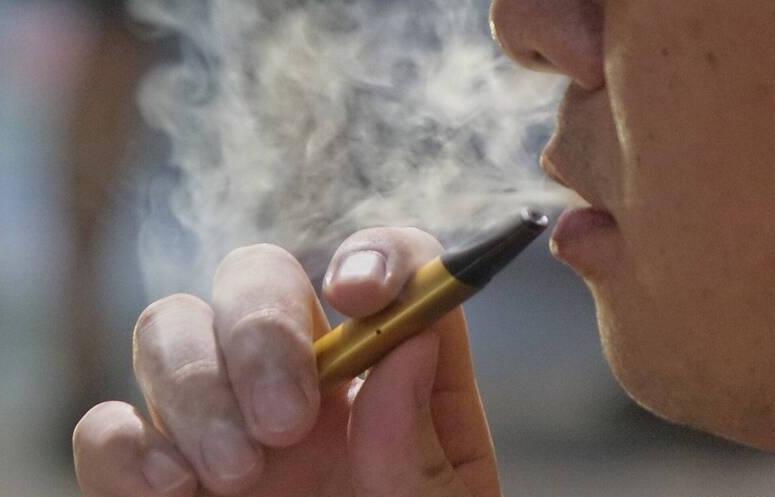The Health Promotion Administration today proposed an amendment to the Tobacco Hazards Prevention Act (菸害防制法) to strengthen regulations against electronic cigarettes and heated tobacco products.
The proposal allows the direct confiscation and destruction of these illegal products and enhances online supervision, Tobacco Control Division head Lo Su-ying (羅素英) said.
After receiving feedback, the agency would submit the proposal to the Executive Yuan for review on Tuesday next week, Lo said, accelerating the normal timeline due to the urgent need to strengthen regulations.

Photo: Liu Hsin-de, Taipei Times
The act was amended on March 23, 2023, to prohibit the manufacture, import, sale, display, advertisement and use of e-cigarettes and unapproved heated tobacco products.
As of Jan. 31, 610,000 contraventions of the act had been recorded, including 654 cases involving e-cigarettes and 2,606 involving heated tobacco, 1,063 cases of illegal use and 150 cases involving 22 different social media and e-commerce platforms, the agency said.
The resulting fines issued total at NT$370 million (US$11.24 million), it said.
Current regulations do not allow e-cigarettes or heated tobacco products to be directly confiscated, meaning they must be returned to the owner even if fines are imposed, Lo said.
The proposed amendment would fill in this loophole, facilitating the accelerated confiscation and destruction of e-cigarettes and heated tobacco products, she said.
The proposal also stipulates that Internet service providers must remove illegal advertisements and restrict access to related content, Lo said.
Failure to delete content or cooperate with investigations would result in penalties, she said.
There have been previous cases of drugs within e-cigarettes, showing that these products not only influence personal health, but also cause societal problems, Lo said.
This proposed amendment would strengthen supervision to prevent these illegal products from circulating, she said.
Although 11 heated tobacco businesses have applied for a health risk assessment, so far none have passed the review, Lo said.
The review process is strictly based on scientific evidence and health standards, as it is the agency’s duty to protect public health, she said.

Alain Robert, known as the "French Spider-Man," praised Alex Honnold as exceptionally well-prepared after the US climber completed a free solo ascent of Taipei 101 yesterday. Robert said Honnold's ascent of the 508m-tall skyscraper in just more than one-and-a-half hours without using safety ropes or equipment was a remarkable achievement. "This is my life," he said in an interview conducted in French, adding that he liked the feeling of being "on the edge of danger." The 63-year-old Frenchman climbed Taipei 101 using ropes in December 2004, taking about four hours to reach the top. On a one-to-10 scale of difficulty, Robert said Taipei 101

Nipah virus infection is to be officially listed as a category 5 notifiable infectious disease in Taiwan in March, while clinical treatment guidelines are being formulated, the Centers for Disease Control (CDC) said yesterday. With Nipah infections being reported in other countries and considering its relatively high fatality rate, the centers on Jan. 16 announced that it would be listed as a notifiable infectious disease to bolster the nation’s systematic early warning system and increase public awareness, the CDC said. Bangladesh reported four fatal cases last year in separate districts, with three linked to raw date palm sap consumption, CDC Epidemic Intelligence

US climber Alex Honnold left Taiwan this morning a day after completing a free-solo ascent of Taipei 101, a feat that drew cheers from onlookers and gained widespread international attention. Honnold yesterday scaled the 101-story skyscraper without a rope or safety harness. The climb — the highest urban free-solo ascent ever attempted — took just more than 90 minutes and was streamed live on Netflix. It was covered by major international news outlets including CNN, the New York Times, the Guardian and the Wall Street Journal. As Honnold prepared to leave Taiwan today, he attracted a crowd when he and his wife, Sanni,

Taiwanese and US defense groups are collaborating to introduce deployable, semi-autonomous manufacturing systems for drones and components in a boost to the nation’s supply chain resilience. Taiwan’s G-Tech Optroelectronics Corp subsidiary GTOC and the US’ Aerkomm Inc on Friday announced an agreement with fellow US-based Firestorm Lab to adopt the latter’s xCell, a technology featuring 3D printers fitted in 6.1m container units. The systems enable aerial platforms and parts to be produced in high volumes from dispersed nodes capable of rapid redeployment, to minimize the risk of enemy strikes and to meet field requirements, they said. Firestorm chief technology officer Ian Muceus said